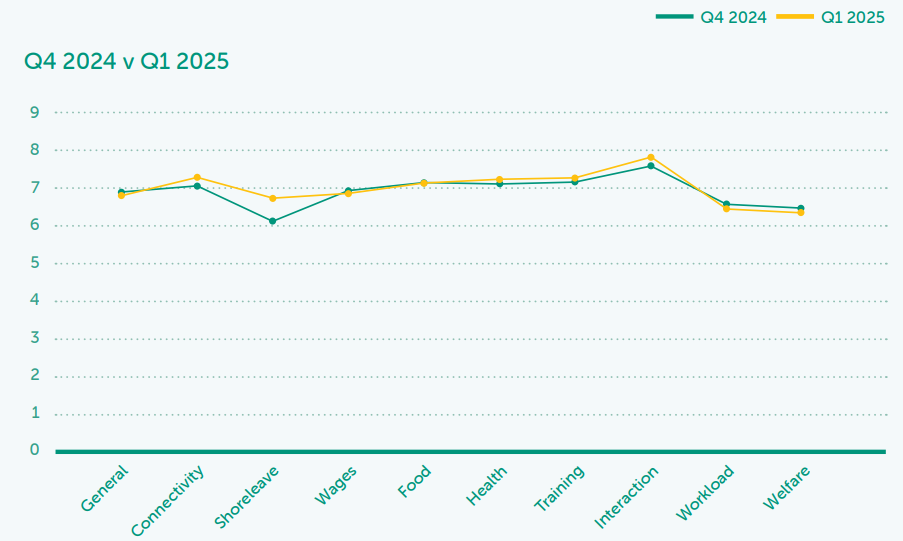The Mission to Seafarers’ latest edition of its quarterly Seafarers Happiness Index has revealed a steadying in seafarer satisfaction, marking a small rise to 6.98 out of 10, up from 6.91 in Q4 2024.
Despite positives, some key concerns were raised in the survey such as the increasing pressures faced by crew aboard older vessels, where mounting maintenance demands are straining already limited resources and impacting morale. According to the Mission to Seafarers, the latest findings reaffirm the constant need to place seafarer wellbeing at the heart of efforts to build a sustainable and resilient maritime workforce.

Credit: Mission to Seafarers
The latest survey identifies safe manning as the most critical concern for seafarers. Respondents described how diminishing crew sizes combined with aging vessel infrastructure create an unsustainable equation. Many reported having to implement triage systems for maintenance tasks, addressing only the most urgent repairs whilst routine upkeep falls behind. This pattern creates cascading technical challenges that seafarers described as ‘overwhelming’ and ‘demoralising’, affecting both operational safety and personal wellbeing.
"It is good to see that the SHI results for Q1 2025 have slightly improved to 6.98 from 6.91 in the previous quarter. While it is positive to see strong teamwork, pride in the profession, and some improvements in connectivity, there continue to be key challenges that shouldn’t be ignored."
… Yves Vandenborn, Head of Loss Prevention Asia-Pacific, NorthStandard, explained.
General Happiness 6.8 ↓ from 6.9
Seafarers expressed a broad spread of emotions about their overall happiness at sea. It was heartening to hear that many take pride and joy in their work, appreciating the “adventure,” the unique experiences, and the ability to support their families financially.
Connectivity 7.29 ↑ from 7.05
The emotional importance of connectivity cannot be overstated. For many seafarers, being able to communicate with family serves as a vital lifeline. If connectivity has worsened due to technical limitations, cost-saving measures, or tightened data controls, it risks deepening feelings of isolation and disconnection — factors that can quickly erode overall happiness.
Shore leave 6.73 ↑ from 6.12
This quarter, shore leave was one of the most frequently discussed concerns, alongside fatigue from workload. The link between the two is clear: relentless work schedules leave no time to step ashore, while the absence of shore leave compounds the exhaustion from relentless work. The latest data paints a stark picture — where shore leave is available, it is often limited to a few rushed hours, if that.
Ben Bailey, Director of Programme, The Mission to Seafarers, said: “Addressing challenges like aging vessels, inadequate training, and restricted shore leave is not just a matter of welfare – it’s essential for operational performance and future-proofing the sector. When seafarers are overburdened with the constant demands of maintaining ageing ships, often with limited support with antiquated tools, their morale and wellbeing clearly suffer, as does the safety and efficiency of operations on board.
Wages 6.86 ↓ from 6.91
For many seafarers, financial reward is naturally the primary reason for enduring prolonged periods away from home and the physical and emotional demands of the job. If inflation continues to rise without corresponding wage increases, purchasing power erodes, and the sense of fair compensation diminishes. This financial strain, especially for those supporting families, risks undermining morale and happiness, making seafarers feel undervalued and underpaid for their efforts.
Food 7.12 ↓ from 7.14
Food and mealtimes are as much about comfort, routine, and a rare opportunity for communal enjoyment. Poor food quality or monotonous meals erode morale and physical health alike.
Ability to keep fit and healthy 7.22 ↑ from 7.13
Where access to fitness facilities, healthy food, or time for exercise are eroded, the physical and mental health of seafarers is compromised. These issues combine with the problems of workload and the potential for fatigue to form a potentially lethal cocktail — impacting both mental health and maritime safety.
Training 7.27 ↑ from 7.17
Many seafarers report a disconnect between their formal training and genuine confidence when facing critical situations. As one respondent noted: “We know the procedures but feels like crossing fingers when things get complicated.”
Despite these pressure points, many seafarers continue to find fulfilment in their work. Strong teamwork and camaraderie were frequently mentioned as key to a positive onboard atmosphere. Many seafarers also enjoy the technical aspects of their roles, while the ability to support their families financially is a major motivator.
"While there are signs of progress in some areas, too many seafarers still face barriers to shore leave, rest, and mental health support. These are not just wellbeing issues, they are operational ones, too"
… said Thom Herbert, Idwal Key Account Manager and Crew Welfare Advocate, Idwal.
Source: Safety4Sea
